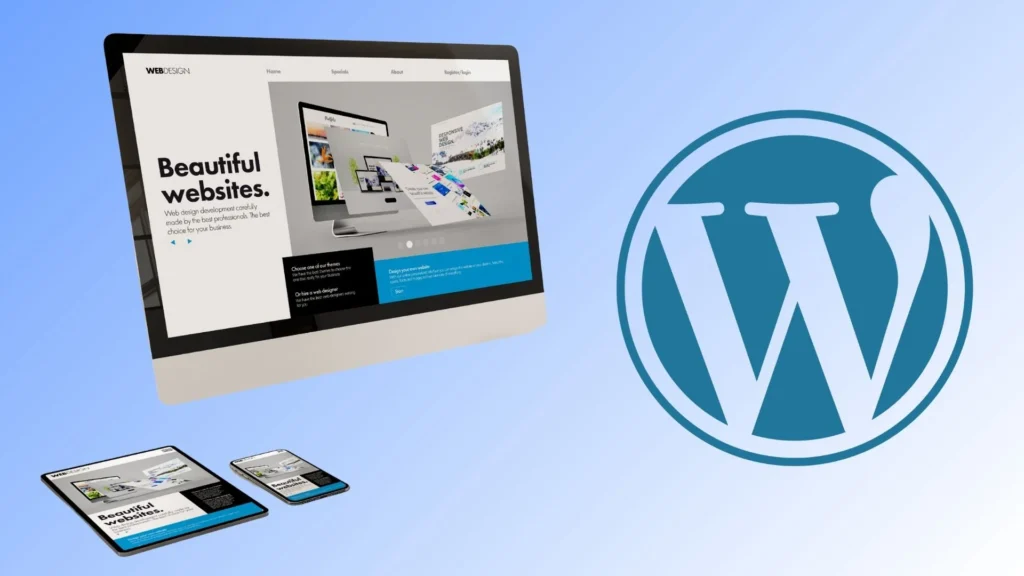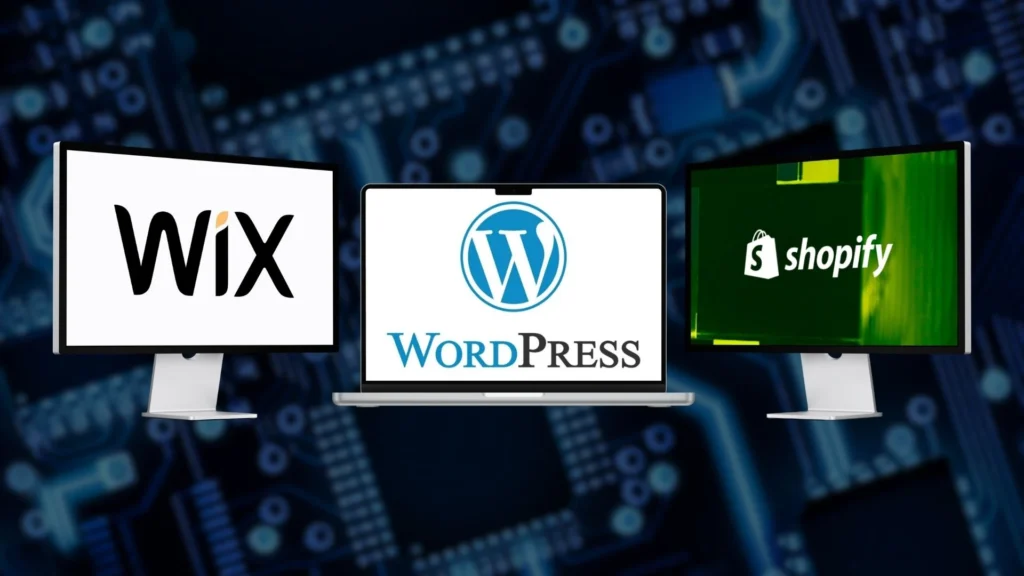Getting a website online has never been easier and more accessible than it is today. While this is great, it does lead to some unsureness for business owners and individuals looking to get a site up for the first time.
We recommend three platforms: WordPress, Shopify, and Wix. While there are dozens of other options out there, these three cover nearly every situation for small to mid-sized businesses, startups, entrepreneurs, and growing e-commerce brands.
So how do you know which one is right for you? In this post, we’ll share our honest insights based on years of experience working with these platforms and helping our clients make the best choice. And if you’d like a more personalized recommendation, don’t miss our free quiz designed to match your specific goals with the right solution.
WordPress

WordPress is our top recommendation. It’s best for those looking for a full control, scalable, and customizable web environment.
WordPress is the most widely used content management system in the world, and for good reason. It powers over 40% of all websites online today. With thousands of themes, plugins, and integrations.
Pros of WordPress
- Full ownership & freedom: Your website lives on your own hosting account. No requirement to lock in with a specific vendor.
- Endless customization: Compared to most other platforms WordPress wins when it comes to flexibility in customization. If you have a specific idea in mind, it’s likely achievable.
- SEO-friendly: WordPress is one of the best platforms for implementing SEO and ranking on search engines. There are many fantastic plugins for SEO and thousands of online resources for SEO support within WordPress
- Scalability: WordPress is a great solution for both small and enterprise businesses.
- Large community: Because of its massive user base, it’s easy to find support, tutorials, and developers for WordPress
Cons of WordPress
- Steeper learning curve: Not as “plug and play” as other drag and drop platforms such as Wix and can be confusing for beginners.
- Ongoing maintenance may be needed: Updates, backups, and security need to be managed on a frequent basis depending on the type of website you have and its infrastructure. Neglecting this can lead to security risks and your site potentially breaking.
- Might require hiring help: Many businesses work with a designer/developer to help them build and update their WordPress site.
One really important thing to understand about WordPress is that there are actually two versions: WordPress.com and WordPress.org. A lot of people don’t realize this and accidentally choose the wrong one.
WordPress.com markets itself as an all-in-one solution with hosting included, but it comes with significant limitations. Many useful features are locked behind paid plans, which can quickly add up. We do not recommend using WordPress.com.
WordPress.org, on the other hand, is the version we strongly recommend. It’s completely open source and free to use, gives you full control over your website, and lets you choose your own hosting provider. With .org, you own your site outright and aren’t stuck behind unnecessary paywalls. Check out this guide to learn more.
If you’re looking for long-term growth and want your site to adapt as your business evolves, WordPress is usually the smartest choice. That’s why it’s our top recommendation for most people we talk to.
Shopify

Shopify is our recommended platform for e-commerce and store owners. While WordPress can also run powerful stores with WooCommerce, Shopify streamlines the process and makes managing products, payments, and orders simple.
Pros of Shopify
- Purpose-built for online sales: Inventory, shipping, and checkout are built in and work great out of the box.
- Easy product management: Even beginners can add products, images, and variations without heavy confusion. The organization options are also well thought out and user friendly.
- Secure and reliable hosting: Shopify sites require hosting with Shopify’s servers, but they are fast, secure, and reliable.
- Large app marketplace: There are many add-ons created from a wide community of developers to open up further customization and functionality.
Cons of Shopify
- Higher cost: Shopify plans start at $29/month when billed annually which is on the higher end. Unlike WordPress, which offers a wide variety of free plugins, the majority of Shopify apps come with a monthly fee. These costs can add up quickly depending on the features you need.
- Less flexible design: Customization options within Shopify’s builder is limited. You work within a theme and are limited to few free theme options. There is a theme marketplace which can open up more options, but premium themes come with a premium cost.
- Not ideal for non-ecommerce sites: Overkill if you’re not selling online. Just don’t if you aren’t selling.
If your main goal is to sell products, Shopify takes care of the heavy lifting. But if your site needs advanced design flexibility or unique features, WordPress with WooCommerce may be a better long-term option.
Wix

Wix is our go-to recommendation for beginners who want a simple, DIY website builder. It’s a great fit for small businesses and personal projects, offering enough versatility to create a professional-looking site without much technical know-how.
Wix does include e-commerce features, but they’re not as strong or scalable as Shopify’s. On the flip side, its customization options give you more flexibility than Shopify, though they’re still limited compared to the power and optimization you get with WordPress.
Pros of Wix
- All-in-one solution: Wix offers hosting, a builder, and more tools all in one package.
- Beginner-friendly: The easy to learn drag-and-drop editor is intuitive.
- Quick to set up: Great for launching something fast.
- Template variety: Offers lots of ready-made designs to choose from.
Cons of Wix
- Limited customization: You’re confined to the drag and drop editor and backend system of Wix which is limited in many areas. Custom code is available, but with limited support.
- Clunky for larger sites: Not ideal if you plan to grow into complex functionality. The editor can be very slow loading at times as well.
- Harder to migrate away from: If you’re looking to migrate to another platform, that will be a challenge and likely require a full rebuild.
Overall, Wix is a great starting point for those who want a simple, no-stress website. But if you expect your site to scale or need custom features, WordPress will serve you better in the long run.
So Which Platform Should You Choose?
Our bottom line is that you should choose WordPress if you want the most flexibility, freedom, and long-term scalability. Try Shopify if e-commerce is your main focus and you want an easy way to sell products online. Go with Wix if you’re just starting out, want an affordable DIY solution, and don’t need advanced features.
Not sure which one is right for you? That’s exactly what our quiz was designed for. Take our Free Website Platform Quiz now to get a personalized recommendation based on your needs!
Frequently Asked Questions
Is WordPress really better than Wix and Shopify?
It really depends on your goals. WordPress is our top recommendation because of its flexibility and ownership. But if your top priority is ease of use (Wix) or selling products (Shopify), those may be better fits for you.
Can I switch platforms later?
Yes, but it’s not always easy. Migrating from Wix or Shopify to WordPress (or elsewhere) requires rebuilding the site and finding the right functionality. That’s why it’s smart to think long-term before making a choice.
Which website platform is the cheapest?
Wix tends to be the most affordable upfront. WordPress costs depend on hosting and whether you hire help. Shopify is usually the most expensive due to monthly fees and app add-ons.
Which website platform is best for SEO?
WordPress is typically the most SEO-friendly. With the right setup and plugins, it gives you maximum control over rankings. Shopify and Wix both have SEO tools, but they’re more limited.
Do I need to hire a developer?
Not necessarily. Wix is designed to be DIY. Shopify can also be DIY, though advanced stores may need developer help. WordPress offers the most control but may require professional setup and ongoing maintenance if you want to avoid the learning curve and time cost.
Final Thoughts
Your website platform sets the foundation for your entire online strategy. Choosing the wrong one can limit growth, while choosing the right one can empower your business for years to come.
We’ve seen firsthand how important this choice is, which is why we created our Free Website Platform Quiz. It’s very quick and could save you from headaches down the road. Feel free to reach out to us as well, we’re always happy to talk through anything you might be unsure about!






